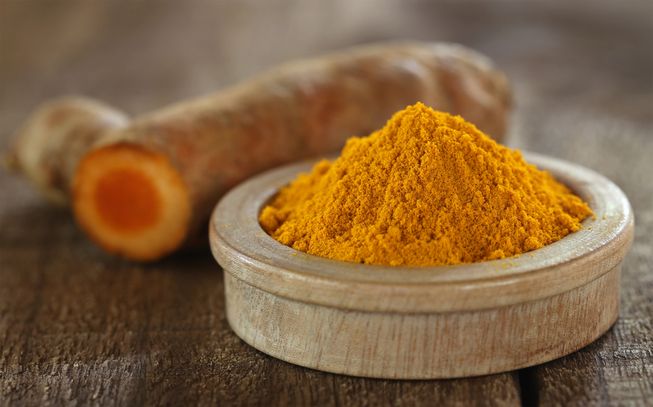
Curcumin, the super ingredient inside turmeric, is a trendy herb that has powerful anti-inflamatory properties and helps cognitive function.
Why does this super ingredient have so much buzz? It helps the human condition in so many ways: From the appearance of your skin to fighting depression or cancer.
While the benefits of curcumin seem too good to be true, curcumin is still a recent discovery in the world of nutrition.
1. NatureWise Curcumin
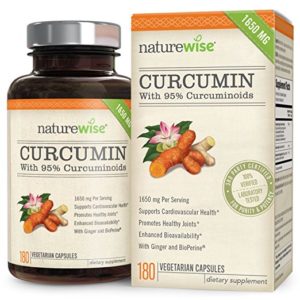
Click here for the lowest price on Amazon
At 750 mg of curcumin per capsule, NatureWise has a high dosage, plus a few extras. There is ginger root extract, which is another powerful antioxidant, and the familiar black pepper extract for absorption and efficacy, but this supplement doesn’t get bogged down with excess ingredients either.
2. Solgar Full Spectrum Curcumin
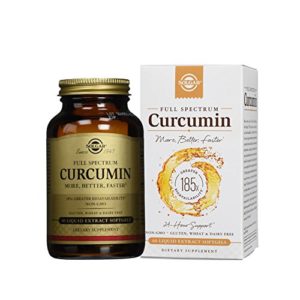
Click here for the lowest price on Amazon
Solgar takes a unique approach to their curcumin supplement. Instead of the standardized extracts used by other companies, Solgar has a special liquid extract they claim is 185x more effective.
As such, the dosage per capsule is far lower. Solgar has a good track record as a supplement company, so the odds are good that they are correct in their assertion.
3. Bio Schwartz Turmeric Curcumin
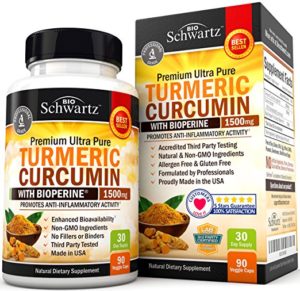
Click here for the lowest price on Amazon
BioSchwarts provides a solid dose of curcumin from a trusted brand. At 500 mg per vegetarian capsule, you can tailor your dosage to meet the right dosage for you. It also includes bioperine, a black pepper extract which helps boost the absorption and bioactivity of the curcumin.
4. Jarrow Formulas Curcumin 95
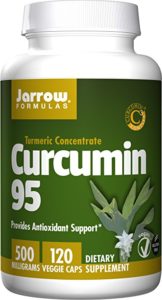
Click here for the lowest price on Amazon
If all you want is a reasonable dose of curcumin without any added supplements, Jarrow Formulas should be your go-to option. It has 500 mg of curcumin per capsule, and aside from the necessary ingredients for the cellulose-based capsule, zero other ingredients.
5. Now Curcumin
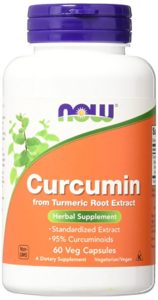
Click here for the lowest price on Amazon
Now Curcumin offers a bulk-buy no-nonsense curcumin supplement. With 665 mg of curcumin per capsule, the dosage is good, though it doesn’t have bioperine like some of the other curcumin supplements out there. Not interested in black pepper extract? Now Curcumin is a great choice.
6. Doctor’s Best Curcumin
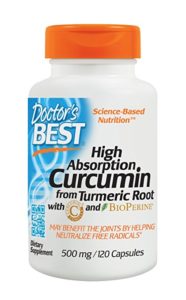
Click here for the lowest price on Amazon
Doctor’s Best provides a similar level of curcumin to other supplements on the market, and it also includes bioperine (black pepper extract) for better absorption. It doesn’t distinguish itself in any particular way, though, so it doesn’t land any further up in the rankings.
7. Health Plus Prime Turmeric Curcumin
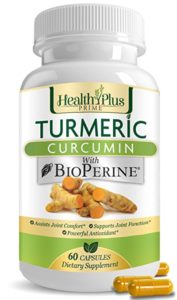
Click here for the lowest price on Amazon
Health Plus Prime has a pretty high dosage of curcumi per capsule at 600 mg, and like many of its competitors, it includes bioperine for better absorption. Its ingredients label doesn’t offer quite as detailed of a breakdown of the curcumin content, though.
8. Nature’s Nutrition Turmeric Curcumin
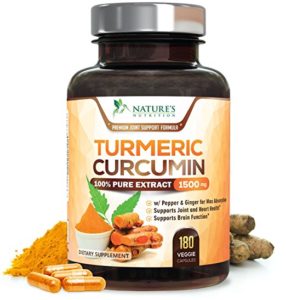
Click here for the lowest price on Amazon
Nature’s Nutrition has 700 mg of cucumin per capsule, and the standard black pepper extract. The only curiosity is that Nature’s Nutrition used their own in-house black pepper extract instead of the commercialized BioPerine used by most other companies.
9. Doctor Recommended Supplements Turmeric Curcumin
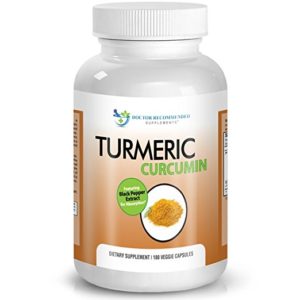
Click here for the lowest price on Amazon
While the label says each serving contains 750 mg, you’ve got to read the fine print. The active ingredients of this supplement are mixed into a “proprietary blend” which has several sources of curcumin with varying levels of purity, and also includes triphala powder. So you don’t really know how much curcumin is in each capsule.
10. Life Extension Super Bio-Curcumin
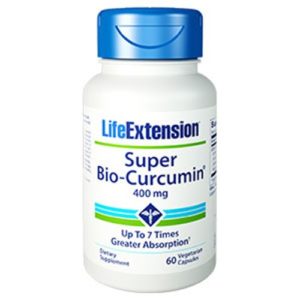
Click here for the lowest price on Amazon
At only 400 mg of curcumin per capsule, Life Extension seems like a pretty low dosage compared to some of its competitors, which offer up to 50% more. They claim their form of curcumin is absorbed seven times better, but don’t provide much in the way of evidence for this.
Curcumin benefits and side effects
Curminin, part of the ginger family, may sound so familiar because it’s the super ingredient from turmeric. In fact, it’s believed that the main benefits of turmeric are drawn from curcumin (1).
Many of the benefits of turmeric, including fighting inflammation, improving brain function, reduced risk of heart disease, fighting cancer, preventing Alzheimer’s disease, depression, arthritis, and aging may be in part due to curcumin.
The issue here is that curcumin alone may have different effects in the body because it is isolated in supplements. Keep reading on to see how different curcumin works differently or better than turmeric.
This yellow miracle molecule is first and foremost a potent antioxidant.
The research goes forward to describe that curcumin “scavenges” oxidative stress and aggressively works to reverse it to repair the body (2).
The proactive nature of curcumin is likely what causes most of the positive health benefits seen through turmeric and curcumin use.
Curcumin protects your liver. Curcumin doesn’t just stop at increasing your general health, it seems to unlock greater health in your liver as well.
One review of the medical effects of curcumin looks at the liver-protecting effects curcumin can have on the body (3).
In patients given carbon tetrachloride, a mild liver poison, patients saw their levels raising thiobarbituric acid and lipoperoxide levels (bad things) and their amounts of glutathione, vitamin C and vitamin E (good things) diminishing (4). Once curcumin is given to the patient, the health markers of liver function seem to go back to normal as the toxin, carbon tetrachloride, is cleared away (5).
Curcumin prevents colon cancer. Curcumin is seen to fight cancer as well. Researchers discovered that curcumin actually works to block COX-2 activity (6).
COX-2 plays an important role in starting cancer growth, especially colon cancers, which is why colon cleansers usually contain them. Luckily, curcumin muddles this process up on a genetic level to keep your cells safe and stop the process that can cause uncontrolled cell growth and tumor cell formation (7).
Curcumin is poorly absorbed and unstable. While curcumin is seen to have many benefits, when it is isolated it is missing a few components that help it be absorbed and used.
Looking to the research, it was seen that only 60% of the curcumin was absorbed in mice, it may be even less in humans who have larger and more complex digestive systems (9).
Curcumin treats indigestion. Curcumin is also soothing for the digestive tract and can help soothe indigestion.
One study looked deeper into this and researchers found that supplementing with curcumin helped about half of hospital patients with indigestion feel better (13).
This was a double-blind study though, so looking more into the numbers and results, researchers found that there was, in fact, a significant difference between the placebo and the curcumin treated patients when it comes to indigestion.
So, the next time you have an upset stomach definitely take a curcumin pill.
Curcumin soothes ulcerative colitis. In addition to treating indigestion, curcumin can go further and treat ulcerative colitis (UC).
Ulcerative colitis is a nasty disorder where you have long-term inflammation in your gastrointestinal tract which can lead to a lot of pain.
Curcumin seems like a safe and effective solution to help bring UC patients into remission, or reduce symptoms.
First, researchers looked and saw that curcumin in combination with mesalamine, a typical UC drug, significantly shortened time to remission for UC patients (14).
Another study shows that supplementing with curcumin can support and maintain remission for UC patients as well to drastically reduce symptoms (15). For these results, the studies used 1.5 grams of curcumin twice a day for results.
Curcumin may fight Rheumatoid Arthritis. One of curcumin’s biggest claim to fame is fighting inflammation and treating arthritis.
One group of researchers reviewed all the papers on curcumin and arthritis and found that there is a definite connection that shows curcumin can reduce symptoms of rheumatoid arthritis (16).
Here, the studies used about 1 gram of curcumin per day to see results. But they also noted that more research needs to be done to establish a stronger link and say that curcumin can treat arthritis because the number of studies they had limited the confidence they have in their findings (17). Here, researchers used 500 mg of curcumin twice a day.
Curcumin reduces symptoms of osteoarthritis. Evidence backs this (18).
Not all arthritis is the same. Rheumatoid arthritis is actually an autoimmune disease. The body is attacking its own joints leading to arthritis symptoms of soreness, pain, and limited range of motion.
On the other hand, osteoarthritis is due to overusing a joint to the point where you have actual wear and tear on the joint. This leads to bone-on-bone situations leading to soreness, pain, and limited range of motion as well.
Luckily, whichever version of arthritis you have it seems that curcumin can effectively reduce your symptoms. Here, researchers supplemented patients with about 1.5 grams per day of curcumin.
Curcumin helps post-workout soreness. Usually, after a training session where you incorporate new exercises or you push yourself harder to get more speed and explosiveness out of your movements, you feel that soreness the next day.
These scientists found that markers of inflammation and muscle damage in the curcumin group were lower than these same markers in the placebo group after both groups performed heavy eccentric exercises (19).
Here, the protocol was to take 500 mg of curcumin twice a day starting two days before exercise and continuing until the day after exercising.
Fight allergies with Curcumin. Researchers discovered that curcumin can actually work to improve breathing and reduce inflammation from the nose for those with allergies (20).
So, with a daily curcumin supplement, you may be saying goodbye to seasonal allergies for good with just 500 mg of curcumin a day.
Curcumin can prevent Type 2 Diabetes. If you’re a prediabetic curcumin might help push you back on track to being healthy.
Curcumin given to prediabetic patients over 9 months was seen to increase insulin sensitivity by improving the function of Beta cells, the ones that produce insulin (22).
Compared to the placebo group, which had about 16% of prediabetics turn into full-blown type 2 diabetics, the curcumin group had NO patients go from prediabetic to diabetic (23).
Here, researchers split 1.5 mg of curcumin into two doses per day.
Curcumin improves blood pressure. There are also a few heart healthy benefits to consuming curcumin regularly.
Especially as you age, the lining of your blood vessels seems to get worse at keeping your blood flowing. One study looked at women to test the effects of curcumin on their circulation and blood pressure.
These women were split up into the placebo group, the exercise group, and the curcumin group. At the end of 8 weeks taking a curcumin pill daily showed the same results as performing aerobic exercise (24)!
Curcumin treats major depression. In the past, curcumin has been linked to fighting depression. However, the studies testing this connection were too poor to find any real benefits.
Researchers gave subjects with major depression curcumin supplements over 12 weeks and tested their improvements with both the Inventory of Depressive Symptomatology self-rated version (IDS-SR30) and Spielberger State-Trait Anxiety Inventory (STAI) tests (25). They gave patients 500 mg of curcumin twice a day.
The results showed that curcumin had a significant effect on positively changing the recorded scores.
Curcumin boosts short-term memory. Curcumin has further brain benefits aside from destroying depression. Research supports that curcumin can actually increase something called BDNF, Brain Derived Neurotrophic Factor (26).
Basically, curcumin can make your brain bigger and smarter (like a nootropic).
For four weeks of supplementation, these researchers saw an increase in memory, calmness, and stress resilience (27). In the short term, researchers saw that curcumin significantly increased attention and memory compared with the placebo and they only gave patients 1 gram of curcumin a day (28).
Not only will curcumin dramatically lower inflammation and reduce your risk of disease, but also it seems to radically make you more focused and attentive to get more done.
Curcumin reduces cognitive decline in Alzheimer’s Disease. In the long term, curcumin may even work to fight dementia.
Specifically, researchers looked to see how curcumin would affect Alzheimer’s Disease (29). While researchers are still not sure if curcumin worked by fighting oxidative stress, reducing inflammation, or working on the cell membranes of brain tissue affected the most by Alzheimer’s, there seems to be a lack of cognitive decline over 6 months (30).
For the future, curcumin can be formulated into a pill that may even improve and reverse Alzheimer’s Disease.
Hack: take curcumin with black pepper. Black pepper has an ingredient inside called piperine that protects curcumin inside the body (11).
In fact, more and more supplement companies are adding in special piperine blends to their curcumin supplements to drastically increase absorption. On study showed that piperine can increase curcumin absorption in humans as much as 2000% (12).
Side effects
Curcumin may amplify effect of prescription drugs. One of the issues with curcumin is that it is so effective it may amplify the effects of other drugs you are taking.
For example, curcumin decreases inflammation and can reduce blood clotting, but if you’re already on a blood thinning medication it can amplify those effects (35).
Another example is the curcumin decreases blood sugar and inflammation, so when you take a drug that already does this, like talinol, you will have enhanced effects that can be unexpected and even dangerous (36).
Caution: Despite it being seen as a safe supplement, be sure you purchase curcumin for reputable buyers.
According to consumerlab.com, about 7% of imported turmeric is contaminated with salmonella and 12% of imported turmeric has “filth” (or bug parts) coming with it (31).
Clearly, the majority of turmeric being imported is safe, but you just have to look out for the cheap brands that cut corners and bring dangerous products to the market.
Recommended dosage
500 mg, twice a day. Curcumin seems safe up to food-level dosages, about 15 grams, but you don’t need to take all that to see results.
Typically, if you have a specific goal you may need to take as much as 4 grams to fight colon cancer, or just 500 mg to prevent allergies.
So, if you’re taking curcumin for general health try starting off with 0.5 grams to 1 gram a day but if you want greater effects to fight a disease then increase your dosages (33).
Ideally, you’ll want to find curcumin that gives you 500 mg of curcumin for about 25 cents (32).
This unit price will make sure you’re getting the best bang for your buck, so that you’re not overpaying for overhyped supplements AND you’re not buying cheap curcumin that is contaminated or full of additives.
Recap
Curcumin is a powerful and effective supplement for a wide range of health conditions. Basically, if you’re looking to lower your risk of chronic disease, increase your focus, and reduce soreness then look no further.
If you don’t have a health condition you’re looking to fix, you may be better with a turmeric supplement instead, otherwise quality curcumin supplements don’t have to break the bank to boost your health.
https://bodynutrition.org/curcumin/ http://bodynutritionorg.tumblr.com/post/166689759704
No comments:
Post a Comment